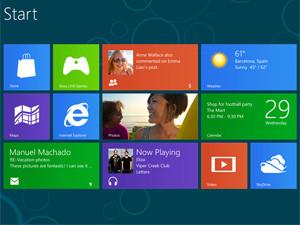
While Windows 8 has not been one of Microsoft's most successful operating systems, the software giant this week confirmed Windows Blue, the upgrade to Windows 8, would be launched later this year.
In an interview with Microsoft's CFO and CMO Tami Reller, by company communications manager Brandon LeBlanc, Reller said Windows Blue will deliver innovations across an increasingly broad array of form factors, of all sizes, display, battery life and performance.
"It will provide more options for businesses, and give consumers more options for work and play. The Windows Blue update is also an opportunity for us to respond to the customer feedback that we've been closely listening to since the launch of Windows 8 and Windows RT. From a company-wide perspective, Windows Blue is part of a broader effort to advance our devices and services for Microsoft."
While Windows 8 has been criticised by consumers and pundits alike, Reller claims that up until now, Microsoft has sold more than 100 million licences. This number includes Windows licences that ship on new tablets or PCs, as well as upgrades to Widows 8.
"This is up from the 60 million licence number we provided in January. We've also seen the number of certified devices for Windows 8 and Window RT grow to 2 400 devices, and we're seeing more and more touch devices in the mix," adds Reller.
She says that while Microsoft realises change takes time, it feels good about the progress since launching.
Although Windows 8 licence sales since its October launch match that of Windows 7, it seems unlikely the new operating system will see the same demand as Windows 7, reaching 240 million sales within its first year.
Unfair judgement
Tech analyst, Liron Segev, says the failure of Windows 8 has been somewhat exaggerated and that for some reason everyone seems to think Windows 8 has performed badly. "Maybe they need to do better PR, but 100 million licences sold is not a bad figure at all."
Segev says Windows 8 came in with a rough start and it was unfairly judged because it was such a big learning curve. "But I think that people have now settled in, and with Windows Blue, what I think a lot of businesses will do, is skip Windows 8 altogether and go to a more stable platform with the second release."
He adds that consumers used to fall into a specific trap where they simply had to upgrade to the newest version of Windows when it came out. "We did that with Windows all along and we did that with Office all along, so you are just constantly upgrading. But if you look at the features, there are lots of companies that are quite happy to run with XP and Office 2003, and they are not missing out on anything."
Segev says Windows 8 is diving much more into the tablet and device market, and is the next evolution in this process. "They started with Windows 8 touch-screens and using the tile mentality, and now with Windows Blue, they will just be carrying that on. So it does make sense in a bigger roadmap."
He adds that Microsoft seems to be learning from its mistakes. "Going from Windows 8 to Windows Blue, I think there's going to be a very little learning curve and all of the old favourites will be back, so that's certainly a good move. Rumour has it they will bring back the Start button and that's quite important."
PC demise
Last month, the International Data Corporation (IDC) Worldwide Quarterly PC Tracker revealed the PC market saw its steepest decline in sales, in the first quarter of the year, since it started measuring the sector in 1994. This marked the fourth consecutive quarter of year-on-year shipment declines.
The IDC said the shipment of PCs declined almost 6% more than originally forecast for the first quarter of 2013, dropping 13.9% year-on-year. The launch failure of Windows 8, and migration to other computing devices, were cited as the main reasons for the steep decline.
When questioned about the demise of PCs, Reller said PCs are still very much alive and are part of a much broader device market of tablets and PCs.
"Windows 8 was built to fully participate in this broader and increasingly mobile device market. The PC part of the market is rapidly evolving to include new convertible devices and amazing new touch laptops, and all-in-ones. These new PCs are hitting the market now and into the back-to-school season, and they are more affordable than ever."
Innovation ailment
Segev says innovation on the operating system front has reached a stagnation phase. "There isn't that wow factor of switching something on and experiencing something that you never have before. Someone will have one feature and the next one will have a similar feature with a left-click instead of a right-click."
But he adds that while there is a lot of hope that Windows Blue will be slicker, better and faster, there is no indication it will have the 'wow' factor. "We can surely expect enhancements but not anything revolutionary in my opinion, but we should get more details from Microsoft at their TechEd in June."
Segev says the former innovation king, Apple, has lost the plot completely. "They're gone from market leaders in the mobile and tablet market, to almost falling way behind its competitors. Now they have to keep up instead of innovating like they used to."
Share